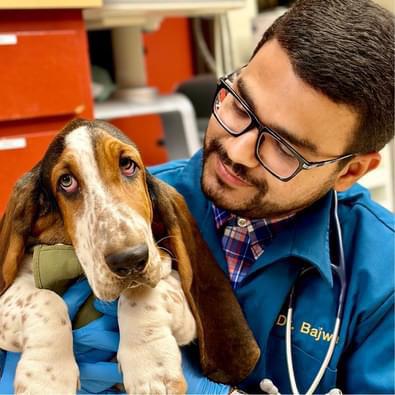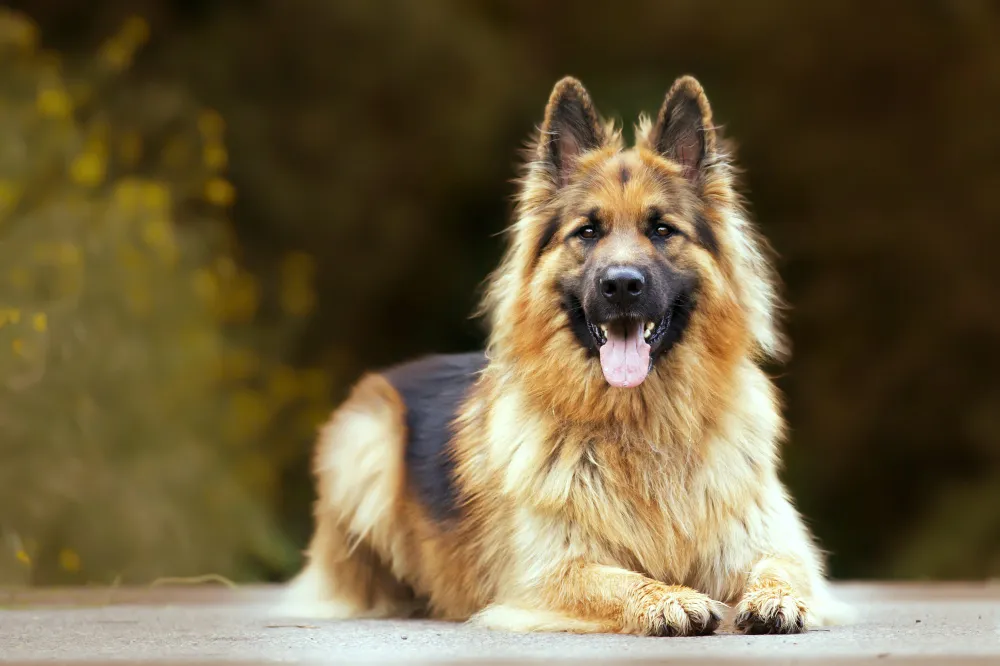Table of Contents
ToggleIf you’ve recently welcomed a German shepherd puppy into your life, get ready for an exciting journey filled with boundless joy and unconditional love. These fascinating creatures are known for their intelligence, loyalty, and protective nature, traits that make them exceptional companions. But just like human babies need extra care during their early stages of life, so do newborn German shepherd puppies.
As a veterinarian, in this article, I will explore essential tips on how to care for newborn German shepherd puppies, ensuring their well-being and setting them up for a lifetime of love and happiness.
Temperature guideline for German shepherd puppies
| Age (days) | Temperature (Fahrenheit) | Temperature (Celsius) |
| 0-4 | 85-90 | 29.5-32 |
| 5-7 | 80 | 26.7 |
| 8-10 | 75 | 23.9 |
| 11-14 | 72 | 22.2 |
| 15-21 | 70 | 21.1 |
Please keep in mind that these are only guidelines. The easiest approach to establish the proper temperature for your puppies is to keep an eye on them and make sure they are comfortable. Adjust the temperature if they appear too hot or too cold.
10 steps for Caring Newborn German Shepherd Puppies
Caring for newborn German shepherd puppies can be a rewarding but challenging experience. These adorable little bundles of joy require special attention and care to ensure their health and well-being. Here are some steps to help you get started:
Prepare a Safe and Comfortable Environment
One of the most crucial elements to consider while caring for newborn German Shepherd pups is establishing a secure and comfortable environment. These little bundles of fur are fragile and vulnerable, so taking the necessary steps to provide them with a secure space is crucial.
Firstly, ensure that you have a designated area for the puppies that is clean, warm, and free from any potential hazards.
This could be a whelping box or a separate room in your home. Make sure the space is disinfected regularly to prevent the spread of any germs or infections. According to research, providing soft bedding such as blankets or towels will give them a cozy spot to rest and sleep.
The study has shown that newborn German Shepherd puppies are completely dependent on their mother for warmth during their first few weeks of life.
If the mother is not present or unable to provide enough warmth due to size or health issues, consider using heat lamps or heating pads placed at one end of the bedding area. Always monitor the temperature closely using reliable thermometers and adjust accordingly.
Monitor the Mother’s Care
One of the most important steps in caring for German Shepherd puppies is closely monitoring the mother’s care. The mother plays a crucial role in ensuring the well-being and survival of her puppies. Keep a close eye on how she interacts with them and ensure that she is providing them with enough milk, warmth, and hygiene.
If you notice any signs of neglect or if the mother seems overwhelmed, it may be necessary to intervene by bottle-feeding the puppies or providing additional support. Monitoring the mother’s care also involves making sure that she has a stress-free environment. Keep visitors to a minimum, provide her with a quiet and comfortable space where she feels secure, and ensure that she has enough food and water available at all times.
A stressed or anxious mother may not be able to care for her puppies properly, so it is essential to pay attention to her needs as well. While it is important to monitor the mother’s care, it is equally crucial to refrain from interfering too much unless necessary.
Always keep a watchful eye from a distance to make sure everything is going smoothly. Remember that every dog and litter is unique; observing their behavior will help you identify when intervention may be needed while allowing them the space they need for healthy development.
Feeding
Feeding newborn German Shepherd puppies is a crucial aspect of their early care. Unlike adult dogs, newborn puppies cannot consume solid food and are solely dependent on their mother’s milk during the first few weeks of life. It is critical to note that the mother’s milk not only gives crucial nutrients but also strengthens their immune system through antibody transfer.
There are instances where hand feeding becomes necessary, such as when the mother is unable to produce enough milk or if she rejects her litter. For hand feeding, it is essential to find a suitable replacement formula specifically made for puppies. These formulas closely mimic the composition of canine milk and provide all the necessary nutrients for their growth and development.
The formula can be warmed up slightly but should always be cool as it can scorch their delicate mouths. Feeding should ideally be done every two hours, replicating how often they would nurse from their mother in nature. As the puppies grow, you can gradually introduce them to solid foods around four weeks old.
Start by blending wet puppy food with some warm formula until you achieve a smooth consistency similar to porridge. This mixture will make it easier for them to transition from liquid to solid food without causing digestive issues. After another week or so, slowly reduce the amount of formula used until they are solely eating solid puppy food. The study has shown that proper nutrition plays a vital role in ensuring healthy growth for newborn German Shepherd puppies.
Keep Puppies Warm
Once the adorable little German shepherd puppies arrive, it is essential to provide them with a warm and comfortable environment. These newborns are highly sensitive to temperature changes and can’t regulate their body heat properly. To keep them warm, create a cozy nest using soft blankets or towels layered in a box or crate.
They are using a heating pad set on low underneath part of the bedding to maintain an optimal temperature of around 85°F (29°C). Make sure that there is enough space for the pups to move away from the heated area if they get too warm.
The study has suggested that warmth is crucial during the first few weeks as these tiny beings are adjusting to life outside their mother’s womb. Monitoring their comfort level regularly will help ensure they are not too cold or overheated.
Puppy Handling
Handling newborn German shepherd puppies requires a gentle approach to ensure their safety and well-being. First and foremost, it is crucial to wash your hands thoroughly before handling the puppies. This helps to avoid the spread of potentially hazardous germs from people to the puppies.
Another important aspect of puppy handling is supporting their heads and bodies properly. Newborn German Shepherds have delicate necks and spines that need to be supported when being lifted or moved around. Use one hand to support their hindquarters while gently cradling their upper body with your other hand. By providing this support, you’ll not only prevent any potential injuries but also help them feel secure in your presence.
Creating a calm environment for the puppies is essential during handling sessions. Find a quiet space free from distractions where they can feel at ease while being handled. Avoid sudden loud noises or any activities that may startle them, as this can induce stress or fear responses in these vulnerable little beings.
Veterinary Care
Proper veterinary care ensures the well-being and health of the puppies from the very beginning. One of the first steps you should take is to schedule a visit with a veterinarian within the first week of their birth. The vet will do a thorough checkup during this appointment to look for any potential health concerns or anomalies.
Regular vaccinations are crucial in protecting your German Shepherd puppies from various diseases. Your veterinarian will advise on which vaccines are necessary and establish a vaccination schedule accordingly. Regular deworming treatments are vital to eliminate common parasites that can harm their health.
In addition to medical checkups and vaccinations, it is important to discuss nutrition with your veterinarian. They will provide recommendations on feeding practices that suit their specific needs throughout different growth stages. A well-balanced diet is essential for optimum growth and preventing nutritional deficits.
Gradual Weaning
Gradual weaning is a crucial step in caring for newborn German Shepherd puppies. As they grow, their nutritional needs change, and transitioning them from their mother’s milk to solid food must be done gradually to prevent digestive issues. Start by introducing soaked puppy food mixed with formula or warm water around the age of three weeks.
The mixture should have a soupy consistency, ensuring easy consumption for the puppies. Over the next few weeks, gradually reduce the amount of liquid in the mixture and increase the proportion of solid food. This slow transition allows their developing digestive system to adjust smoothly without causing any discomfort.
Alongside this process, it is essential to monitor their progress closely; some puppies may adapt quickly, while others may take more time. By being patient and observant during gradual weaning, you can ensure that your German Shepherd puppies flourish as they take their first steps towards independence and lifelong health.
Puppy-Proof the Environment
When bringing home newborn German Shepherd puppies, it is crucial to puppy-proof your environment to ensure their safety and well-being. Start by getting down on all fours and seeing the world from their perspective. Remove any items or objects that could be potentially hazardous or toxic, such as cleaning supplies, electrical cords, small toys, or plants.
Keep in mind that curious little pups have a natural inclination to explore and chew on anything they find. It is essential to create a safe space specifically designed for your German Shepherd puppies. This can be achieved by setting up a designated area with puppy gates or using crates for confinement when necessary.
Their designated space should include comfortable bedding, fresh water within reach, and interactive toys suitable for their age and size. Ensuring they have a secure area will not only keep them out of trouble but also give you peace of mind, knowing they are safe.
Remember your surroundings outside the designated puppy area. Secure loose wires and cables against walls or cover them with cord protectors to prevent chewing accidents. Keep doors closed leading to rooms you wouldn’t wouldn’t want your curious furry friends venturing into unsupervised.
Early Training and Socialization
In terms of training, starting early is key. Begin by introducing basic commands such as sit, stay, and come when the puppies are around 6-8 weeks old. Keep training sessions short and fun, using treats or toys as positive reinforcement. Exposure to various stimuli like different sounds, textures, and environments is crucial in their socialization process. Take them on walks in different settings or invite friends over so that they can meet new people.
The importance of early training and socialization cannot be stressed enough when it comes to German Shepherd puppies. Being consistent in their care from day one will help foster their confidence and curiosity about the world around them.
Through gentle handling, basic obedience training, and exposure to diverse experiences at an early age, these intelligent pups will grow up into well-rounded companions who are a joy to have by your side.
Love and Patience
Caring for German Shepherd puppies can be both a rewarding and challenging experience. One of the most important steps is to provide them with love and patience. Puppies from this breed are known for their intelligence and loyalty, but they also require a firm yet gentle approach when it comes to training and socialization.
To ensure their well-being, spending quality time with the puppies is crucial. Interact with them through playtime sessions that stimulate their minds and bodies. Engage in activities like fetch or obedience exercises to help build their confidence and establish a bond between you and your puppy. Remember, positive interactions are key; use rewarding techniques such as treats or praise when they display good behavior.
Conclusion
In conclusion, caring for newborn German Shepherd pups needs devotion, patience, and a thorough grasp of their specific requirements. From providing a warm and safe environment to ensuring proper nutrition and regular veterinary checkups, every aspect of their care is crucial in fostering their healthy development.
You may provide a nurturing and loving environment for your newborn German Shepherd pups by following the suggestions outlined in this article. Remember to give them plenty of socialization and training opportunities as they grow older. With your unwavering commitment and love, these puppies will thrive and grow into loyal and well-adjusted adult dogs.
FAQs
1. How often should I feed newborn German Shepherd puppies?
Newborn German Shepherd puppies should be fed every 2-3 hours for the first few weeks of their lives.
2. What type of food should I give to newborn German Shepherd puppies?
At this stage, it is best to feed them a high-quality puppy milk replacement formula specifically made for newborn puppies.
3. How can I help keep the newborn puppies warm?
Provide a warm and cozy environment by using heat lamps or heating pads, ensuring they don’t get too hot but maintain a comfortable temperature.
4. When should I start socializing the puppies?
You can begin gently exposing the puppies to different sights, sounds, and gentle handling at around three weeks of age.
5. Is it necessary to trim the nails of newborn German Shepherd puppies?
No, it is not necessary, as their nails are usually very soft and short at this stage. However, monitor their growth and start trimming once they become longer and sharper.

Dr. Usman Bajwa, a dedicated veterinarian with a passion for pets, brings years of expertise to the world of pet grooming. Through his blog, he shares valuable insights and practical tips to help pet owners provide the best care for their furry companions. With a focus on promoting the health and happiness of pets, Dr. Usman articles offer easy-to-follow guidance on grooming techniques. When he’s not writing, you can find him at his clinic or enjoying time with his own beloved pets.




